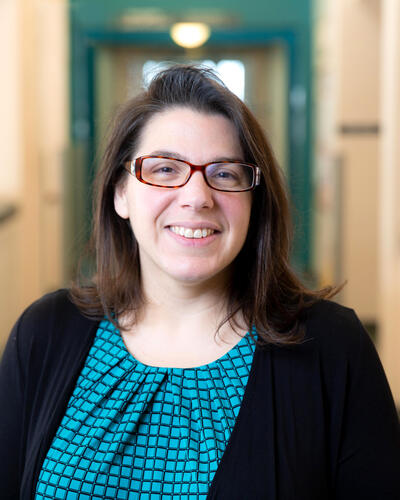Roth joined the faculty in 2014. She attended Lafayette College as an undergraduate and the University of Michigan for her Ph.D. Her main areas of specialization include Moral & Political Philosophy, Bioethics, Feminist Philosophy, and Gender & Sexuality.

Office Hours
Fall 2022 TBD
Also by appointment.
Curriculum Vitae
Education
B.A., Lafayette College (2004)
M.A., Ph.D., University of Michigan (2010)
Publications
“Nonideal Theory and Ethical Pragmatism in Bioethics: Value Conflicts in LGBTQ+ Family-Making” in Applying Nonideal Theory to Bioethics: Living and Dying in a Nonideal World, edited by Elizabeth Victor and Laura Guidry-Grimes 2021
“What is Pregnancy Ambivalence? Is it Maternal Ambivalence?” for The Maternal Tug: Ambivalence, Identity, and Agency, edited by Sara LaChance Adams, Tanya Cassidy, and Susan Hogan, 2020
“Double Rainbow Baby” (creative nonfiction essay), Forthcoming in Swelling with Pride: Queer Conception and Adoption Stories, ed. Sara Graefe
“Experience as Evidence: Pregnancy Loss, Pragmatism, and Fetal Status” The Journal of Social Philosophy, 49, 2 (Summer 2018): 270-93.
“(Feminist) Abortion Ethics and Fetal Status” Bloomsbury Companion to Analytic Feminism [Peer-reviewed volume], ed. Pieranna Garavasco 2018
“Introduction to Feminist Value Theory” in Bloomsbury Companion to Analytic Feminism [Peer-reviewed volume], ed. Pieranna Garavasco, 2018 (co-authored with Pieranna Garavasco)
“(Queer) Family Values and ‘Reciprocal IVF’: What Difference Does Sexual Identity Make?” Kennedy Institute of Ethics Journal, 27, 3 (Sept. 2017): 443-73
“Clinical Responses to Infertility in Lesbians and Queer Women,” Fertility & Sterility Dialog May 15, 2017 (co-authored with Timothy Murphy)
“So This Lesbian Couple Walks into a Fertility Clinic: Bioethics and the Medicalization of Queer Women’s Reproduction,” APA Newsletter on Lesbian, Gay, Bisexual, and Transgender Issues in Philosophy, 15 No. 2 (Spring 2016): 6-12.
“What Does Queer Family Equality Have to Do With Reproductive Ethics?” International Journal of Feminist Approaches to Bioethics 9 No. 1 (Spring 2016): 27-67.
Classes
-
PHIL 204: Feminist Philosophy
This course provides an introduction to contemporary work in feminist philosophy and will apply philosophical methods of reasoning to a variety of topics of feminist concern. Throughout the course we will stress the diversity of feminist theories and approaches. We will also emphasize the ways in which feminist work has intervened in various subfields of philosophy as well as taking up and evaluating feminist criticism and transformation of philosophy as a discipline.
-
PHIL 359: Social & Political Philosophy
This course will consider some of the foundational issues we face in our search for the best group-living arrangements. Such issues will include, but not be limited to, the conflict between individual liberty and social equality, the criteria for just distribution of wealth, and the proper role and form of government. We will consider how questions about these issues have been addressed historically by philosophers since Plato and Aristotle. We will also explore how contemporary political works by Rawls, Nozick, and others might help us understand and try to solve our own political and social problems.
-
WGST 320: Gender & Sexualities
This course will involve a multi-disciplinary, feminist exploration of the intersections of gender, culture, and sexuality. The experiences of historically devalued groups, including girls and women, sexual minorities, and people of color will be emphasized. Students will investigate the limitations of binary classification systems as pertaining to gender roles, gendered behavior, sexual behaviors, and sexual orientation. Topics to be covered may include, but are not limited to, sexuality as depicted in Western media, variations in biological sex, gender identity, sexual orientation, socialization and sexual and reproductive freedoms.